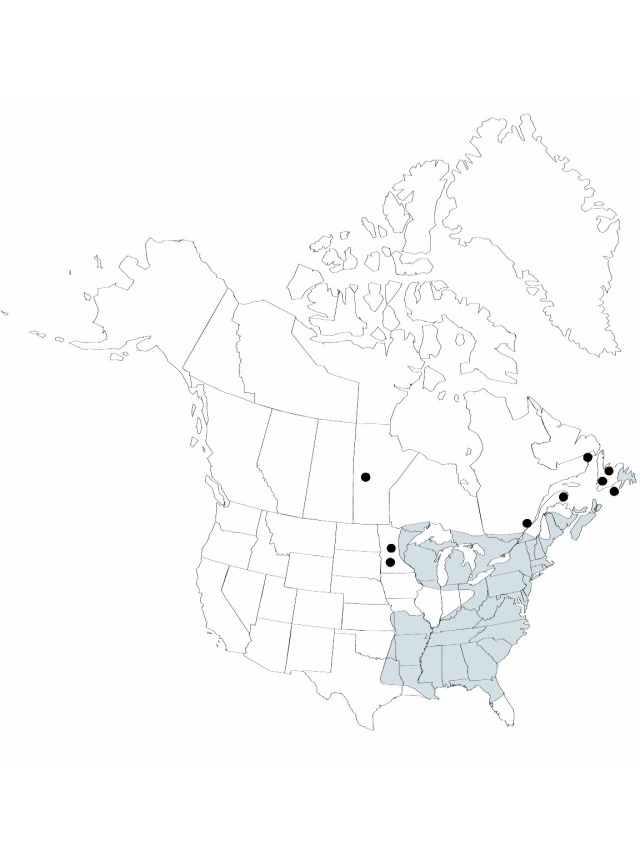Sparganium americanum
The Genera of North American Plants 2: 203. 1818.
Plants slender and grasslike to usually robust, to 1 m; leaves and inflorescences usually emergent. Leaves erect but not especially stiff, usually keeled only near base, flattened distally, to 1 m × 6–12 mm. Inflorescences: rachis 0–3-branched, erect; bracts somewhat ascending, not basally inflated; pistillate heads 1–3 on branches, 2–6 on main rachis, axillary, not contiguous at anthesis, sessile, 1.5–2.5 cm diam. and often contiguous in fruit; staminate heads usually 3–7 on each branch, 4–10 on main rachis, not or barely contiguous. Flowers: tepals often with prominent subapical dark spot, entire to crenulate or emarginate; stigma 1, linear-lanceolate. Fruits tan to dark greenish brown, dull, subsessile to stipitate, fusiform, sometimes barely constricted near equator, body not strongly faceted, 3.5–5(–7) mm, tapering to beak; beak usually curved, not hooked, 3–5 mm; tepals attached at base, reaching equator or slightly beyond. Seeds 1.
Phenology: Flowering late spring–summer (Apr–Jun southwestward, May–Sep southeastward, Jun–Aug northward).
Habitat: Shores and shallow neutral-to-alkaline waters, sometimes forming large stands
Elevation: 0–800 m
Distribution

St. Pierre and Miquelon, Man., N.B., Nfld. and Labr. (Nfld.), N.S., Ont., P.E.I., Que., Ala., Ark., Conn., Del., Fla., Ga., Ill., Ind., Iowa, Kans., Ky., La., Maine, Md., Mass., Mich., Minn., Miss., Mo., N.H., N.J., N.Y., N.C., Ohio, Okla., Pa., R.I., S.C., Tenn., Tex., Vt., Va., W.Va., Wis., Mexico (Durango).
Discussion
For differences between this highly polymorphic species and the similar but less variable Sparganium androcladum, see the discussion under that species. Also see the discussion under S. emersum.
E. O. Beal (1977) recognized three morphologically overlapping races of Sparganium americanum: the coastal race, growing in the lower coastal plain from Virginia to Florida and Louisiana, and north in the Mississippi Embayment to Oklahoma, Arkansas, and Missouri, has leaves wide for the species, rachises 2–5-branched, and stigmas 1.5+ mm long; the Appalachian race, growing in the Appalachian region from Maine to western North Carolina and in the Ozark Mountains, has leaves narrow for the species, rachises simple to sparingly branched, and stigmas 0.9 mm or less; and the ubiquitous race, growing throughout the range of the species with increasing robustness southward, morphologically overlaps the others.
Selected References
None.